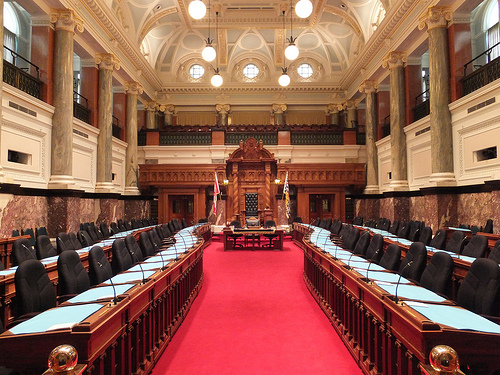If there is a new government in B.C. on May 15, it will be confronted with issues that make the transition harder than most government changeovers we have seen in the past.
The financial issues are a given. Debt has gone up. Possibly, given the economic recession we faced, it should have gone up even further. The dramatic rise in long-term contractual obligations is more of a concern. Most of this is made up of the $53 billion we will be paying independent power producers decades into the future. And, of course, there are the BC Hydro deferral accounts identified by the auditor general that will inevitably push up our hydro costs.
However, it is not just the financial cupboard a new government will find empty. Cabinet ministers returning to power after being gone for a decade will find that both the powers and the capacity of government have been hollowed out.
The current government is party to a number of trade agreements that will limit a new government’s ability to act. The Trade, Investment and Labour Mobility Agreement (TILMA) which morphed into the New West Trade Agreement, along with the Agreement on Internal Trade all have provisions that limit what a government can do. Of even more concern is the impending Canada European Union Trade Agreement (CETA) which the current government may sign even before the May 14 election.
Unlike most previous trade agreements CETA directly affects the powers of provinces and local governments. As such the provinces have had a say as to what they were willing to give up. So far the B.C. Liberals have refused to say what they have put on the table.
We do know, however, what they gave up in another trade deal that had provincial participation and that was everything. While other provinces protected their hydro, education systems, crown corporations and smaller communities, the only thing B.C. Liberals held back from foreign interests was the legislature.
A new government may also find itself hamstrung by the lack of qualified people to deliver a more activist agenda. First of all, just in terms of getting things done, there are 22 per cent fewer employees in the Ministries than there were a decade ago. During that period B.C.’s population grew by 12 per cent. No wonder there is no one left to look after our forests and parks. No wonder when an employee gets cheated by the boss there is no one there from the Employment Standards branch to protect their interests.
Some key government functions have been outsourced. In 2004 the government handed administration of Pharmacare and health-care information over to Maximus, a subsidiary of an American company. B.C.’s Auditor General has said that deal, which continues, has not delivered what it promised.
The government’s procurement capacity has largely been devolved to a private company owned by the Ministry of Finance, Partnerships BC. Originally set up to deliver public private partnerships PBC has extended its mandate to the point that it now even has the responsibility for buying school portable classrooms.
Even the B.C. Construction Association has raised red flags about this in a January report that called for…
a strong group within government — independent from asset owners and major capital ministries, with a mandate to advise on and implement government policy, and to coordinate capital planning and project approval. For example, Alberta has a Ministry of Infrastructure with these functions. Of course, that is not the only option for a strong central capital management agency — BC previously had the Capital Division.
And then there are the multitudes of long-term agreements that will hobble the government’s policy capacity. The Liberal government has built seven public private partnership hospitals and has four more on stream. All of these involve contracts of more than 30 years. Years ago I had a conversation with an official from Carillion Canada, an outsourcing firm that manages services in P3 hospitals. I work for CUPE and he said I was crazy to be opposing P3 hospitals. He explained that if policies or technology changed a public hospital could be closed. Not a P3 hospital. They will stay open whether they are needed or not because of the long-term contracts, he explained.
Sometimes hospitals do close. In Regina a hospital was closed and turned into an Institute of Technology. But with P3 hospitals, roads, bridges and sewage plants, governments don’t get that choice.
What else is tied up in long-term contracts? How about $53 billion in private power contracts? These are worse than P3s because at least with P3s the government owns them at the end of the term.
The latest measure that would tie a new government’s hands was the attempt to cut a 10-year deal with the B.C. nurses. The CBC reports health authority presidents saying they are concerned an extended agreement of up to 10 years could saddle the system with significant costs, and restrict the ability for health authorities to manage the system, all at a time when government is moving to rein in health care funding. That’s an interesting response for people who had 35-year public private partnerships foisted on them that saddled them with costs and restricted ability to manage when governments were moving to reign in health-care spending.
The conservative movement has been trying for 30 years to erode the power and capacity of government. In B.C. that has been accomplished by undermining financial capacity, through trade agreements limiting provincial power, through outsourcing administration and decision making and through long-term agreements tying a new government in knots.
The NDP leader has been quoted as saying he hopes for a two-term government. No wonder. The problems imposed on this province in the last 12 years will not be solved overnight.
Photo: Aidan Wakely-Mulroney/Flickr



